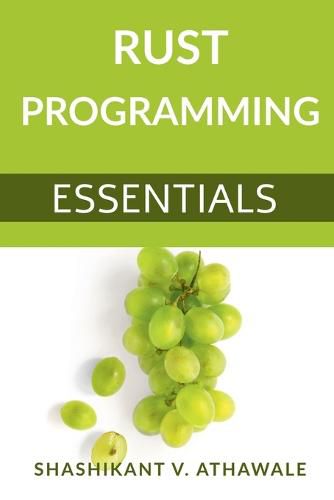Readings Newsletter
Become a Readings Member to make your shopping experience even easier.
Sign in or sign up for free!
You’re not far away from qualifying for FREE standard shipping within Australia
You’ve qualified for FREE standard shipping within Australia
The cart is loading…






This title is printed to order. This book may have been self-published. If so, we cannot guarantee the quality of the content. In the main most books will have gone through the editing process however some may not. We therefore suggest that you be aware of this before ordering this book. If in doubt check either the author or publisher’s details as we are unable to accept any returns unless they are faulty. Please contact us if you have any questions.
Key Features: For application-level programming, modern programming languages such as Python, JavaScript, and Java are becoming more popular, but for systems programming, Rust promises the best of both worlds: Java's type safety and C++'s speed and expressiveness, as well as memory safety without the use of a garbage collector. If you're new to Rust and systems programming and want to construct dependable and efficient systems software without using C or C++, this book is a great place to start. The book offers a novel approach by beginning each chapter with key functions. You'll move on to more advanced topics as you improve. Before learning how to utilize and build Rust with Web Assembly, you'll explore network programming, focusing on features such as working with low-level network primitives and protocols in Rust. You will have the practical skills to create systems software tools, libraries, and utilities in Rust by the end of this Rust programming book.
What you'll discover
Examine the memory layout of Rust programmers to learn more about memory management.Learn about the Rust Standard Library's capabilities and features.To boost productivity for future Rust programming projects, look into external crates.
Who is this book for?
This book is for developers who have a basic understanding of Rust but little or no experience with systems programming. This book will be valuable for system programmers who want to consider Rust as an alternative to C or C++.
$9.00 standard shipping within Australia
FREE standard shipping within Australia for orders over $100.00
Express & International shipping calculated at checkout
This title is printed to order. This book may have been self-published. If so, we cannot guarantee the quality of the content. In the main most books will have gone through the editing process however some may not. We therefore suggest that you be aware of this before ordering this book. If in doubt check either the author or publisher’s details as we are unable to accept any returns unless they are faulty. Please contact us if you have any questions.
Key Features: For application-level programming, modern programming languages such as Python, JavaScript, and Java are becoming more popular, but for systems programming, Rust promises the best of both worlds: Java's type safety and C++'s speed and expressiveness, as well as memory safety without the use of a garbage collector. If you're new to Rust and systems programming and want to construct dependable and efficient systems software without using C or C++, this book is a great place to start. The book offers a novel approach by beginning each chapter with key functions. You'll move on to more advanced topics as you improve. Before learning how to utilize and build Rust with Web Assembly, you'll explore network programming, focusing on features such as working with low-level network primitives and protocols in Rust. You will have the practical skills to create systems software tools, libraries, and utilities in Rust by the end of this Rust programming book.
What you'll discover
Examine the memory layout of Rust programmers to learn more about memory management.Learn about the Rust Standard Library's capabilities and features.To boost productivity for future Rust programming projects, look into external crates.
Who is this book for?
This book is for developers who have a basic understanding of Rust but little or no experience with systems programming. This book will be valuable for system programmers who want to consider Rust as an alternative to C or C++.